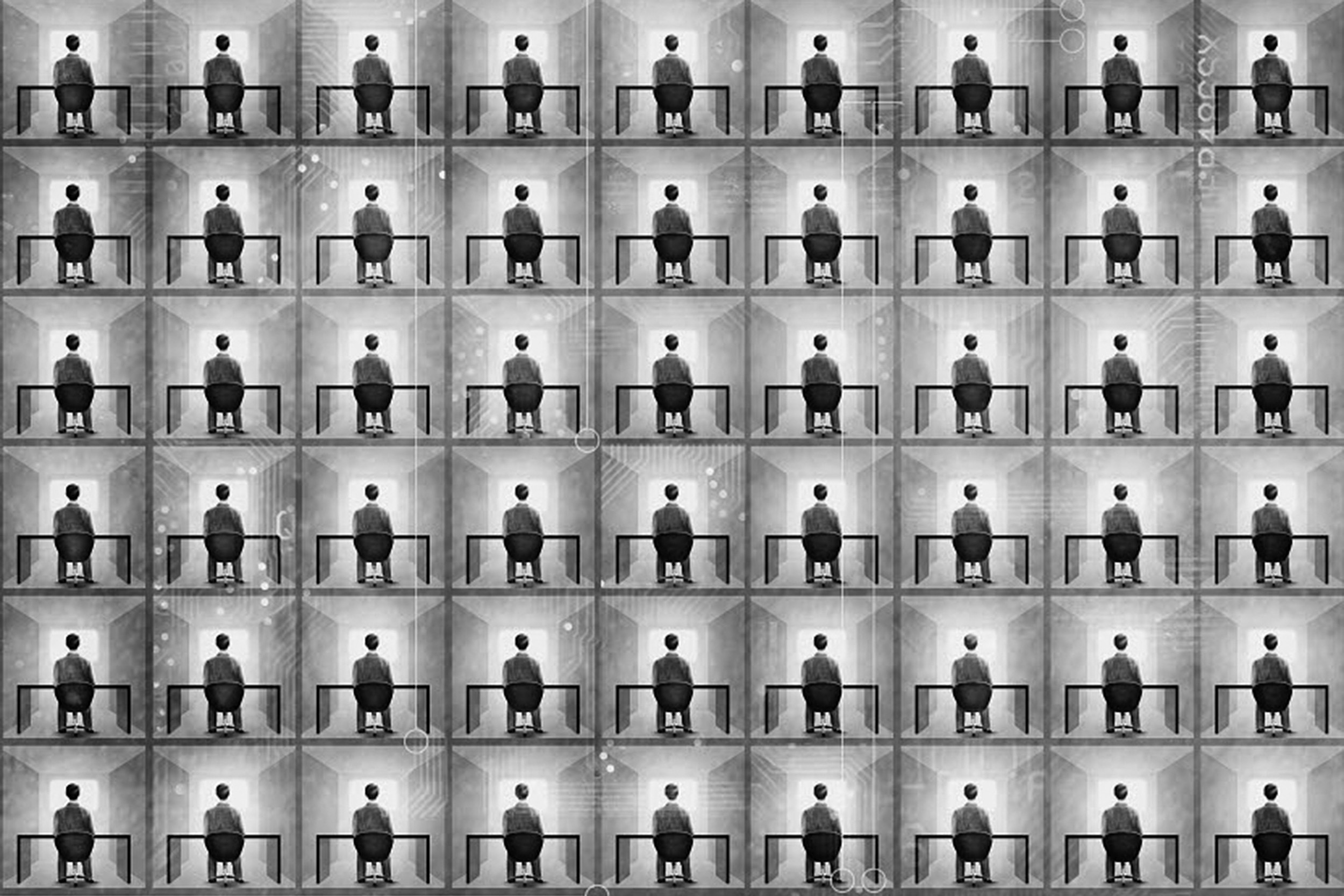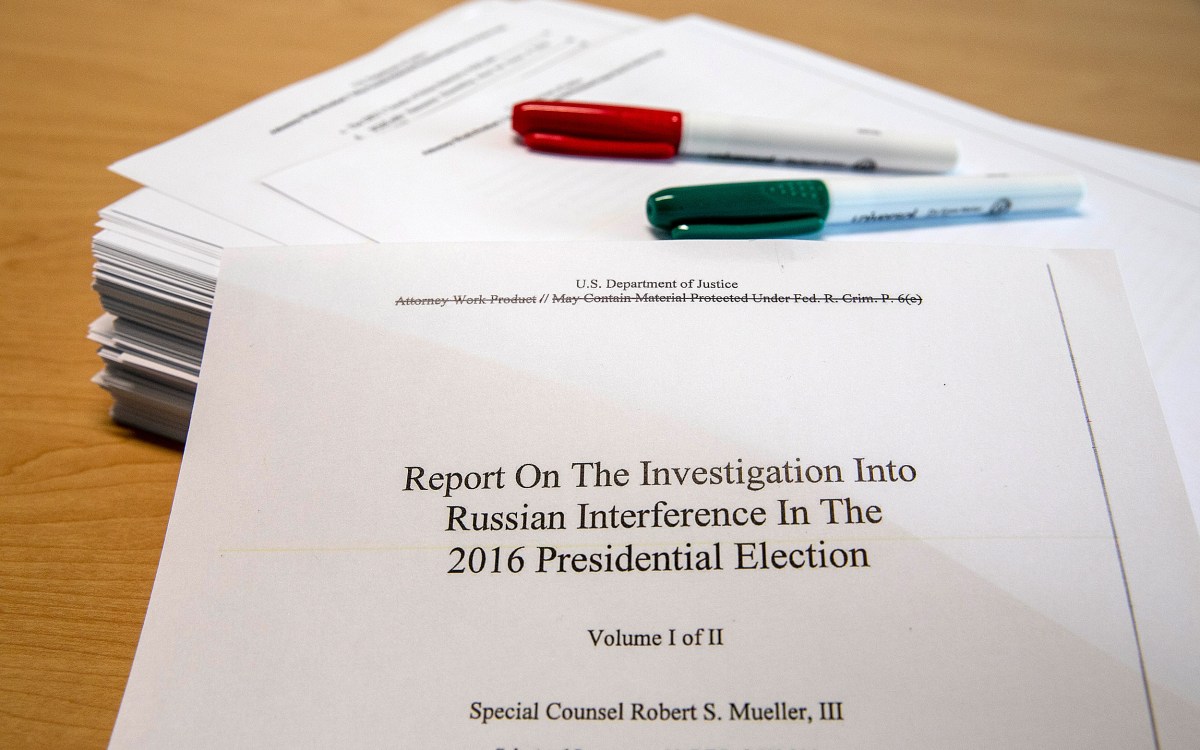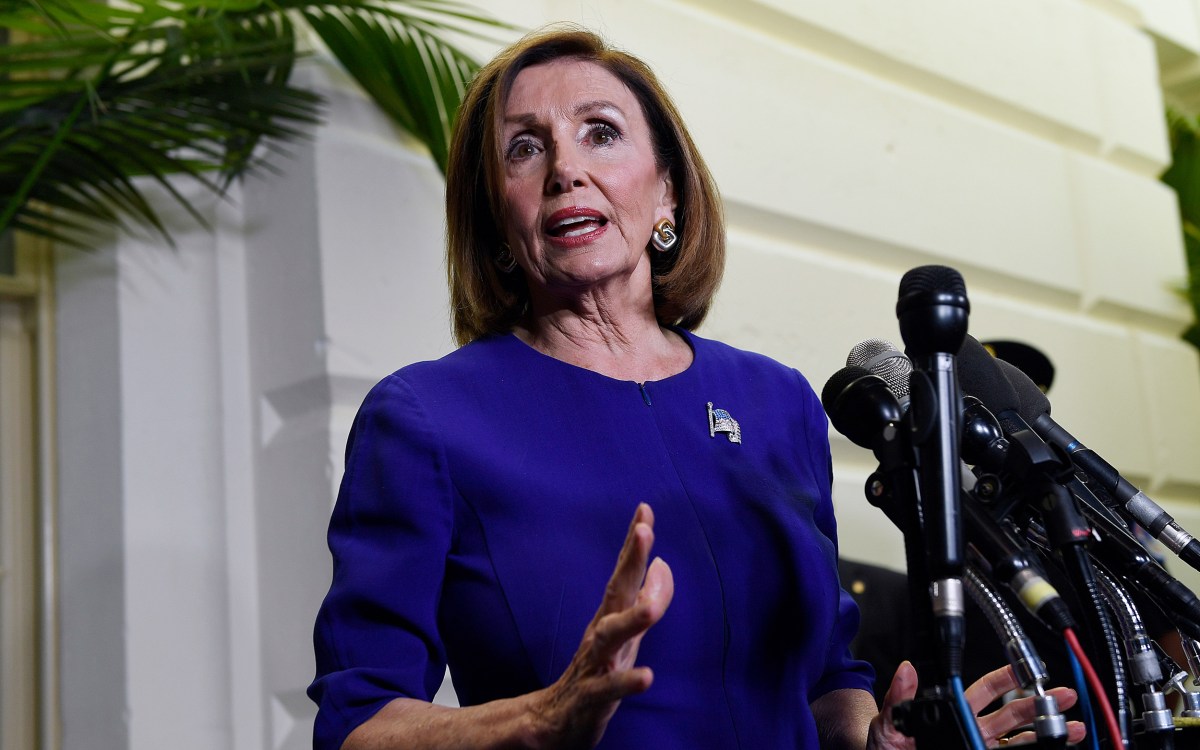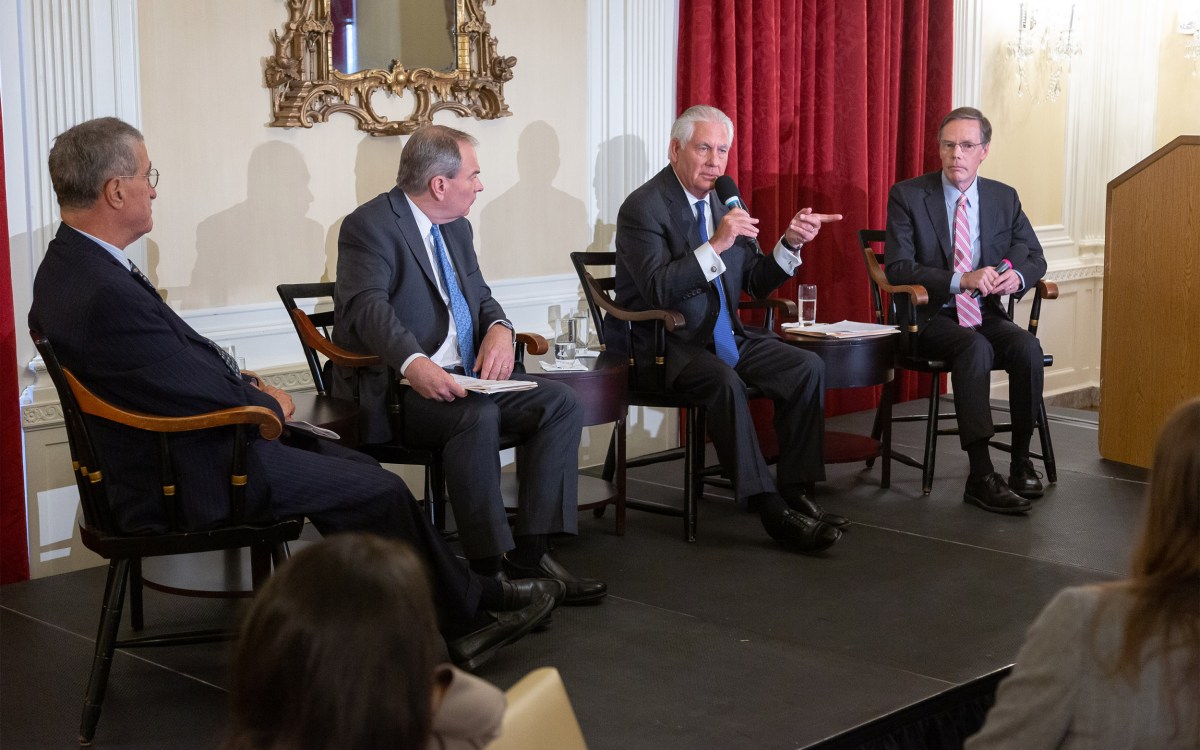
Pulitzer Prize-winning reporter James B. Stewart, J.D. ’76 , talks about his new book, “Deep State: Trump, the FBI, and the Rule of Law,” and the president’s ongoing battle with the nation’s top law enforcement agencies.
Illustration by Metropolis
Inside the Mueller inquiry and the ‘deep state’
A vivid account of the very beginnings of the FBI investigations of Hillary Clinton and Donald Trump through the election and the special counsel’s report
The report by special counsel Robert Mueller on President Trump and Russian involvement in the 2016 election left many unanswered questions, among them what was going on inside the FBI when, unbeknownst to the public, the agency was conducting criminal investigations of both presidential candidates, Hillary Clinton and Trump, just months before balloting. In a new book, “Deep State: Trump, the FBI, and the Rule of Law,” Pulitzer Prize-winning reporter James B. Stewart, J.D. ’76 , a New York Times columnist and New Yorker staff writer, offers a vivid, fly-on-the-wall account of the events that led to Mueller’s appointment by Rod Rosenstein, J.D. ’89, and its aftermath. Stewart weaves together the strands of incidents that began with Clinton’s handling of State Department emails and ends with the findings of Mueller’s inquiry — an investigation the president has called part of a “deep state” conspiracy against him. Stewart spoke with the Gazette about Mueller’s perceived failures, the Trump administration’s growing Ukraine scandal, and the president’s ongoing battle with the nation’s top law enforcement agencies.
Q&A
James B. Stewart
GAZETTE: You cover a lot of familiar ground, from the beginning of the Clinton email saga through the Russia election-interference investigation, showing how deeply intertwined they were. What was your intention?
STEWART: Several things. First of all, just as a writer, I thought, it’s a great story; it has great characters; and it illuminates some enormously important issues that go beyond just the immediate conflict. It has a very dramatic conflict driving this story, which is the White House, Trump, locked in combat with the major investigative agencies of the federal government, mostly the FBI, but also, to varying degrees, the Justice Department, which is unprecedented in my experience. And then, the FBI was thrust into the position of investigating both nominees for president at the same time, which people, because they learned first about the Clinton email investigation and then only after the election did they learn about the Trump Russia investigation; a lot of people didn’t realize that these things were going on simultaneously. And then the characters — say what you will about Trump, he’s a great character. And on the other side, you have an array of also very fascinating characters starting with Jim Comey, who’s about as opposite a personality from Trump as you can possibly conceive of. What is it illuminating? It’s the role of law in our government and the ultimate question: Is any person above the law? What unique problems does this pose when parts of the executive branch are investigating major candidates for president? It does go to the whole concept of the rule of law, which is something that I thought most Americans took for granted, but now they have to be reminded about what it is.
GAZETTE: There seemed to be so many odd, unforced errors on all sides that had major repercussions on the events of the last few years — Clinton’s mishandling of State Department emails, the later discovery of some of those emails on her aide Huma Abedin’s husband’s laptop, Trump’s TV confession that he fired Comey to stop the Russia investigation, the imprudent texts on FBI-issued phones between top FBI staffers, Comey’s dithering over both opening an investigation into Trump and reopening the one into Clinton’s emails.
STEWART: I did think several times, my God, you couldn’t make this up. This almost seemingly random alignment or the way certain events played into each other. It was important to me to weave all this together in chronological order so that people could understand the cause-and-effect elements of that. I think typically we digest the news in the order in which reporters find out about it, and that’s not the order in which it occurs. I hope I straighten a lot of this out.
GAZETTE: The House impeachment inquiry underway takes up one of the key questions of the Mueller investigation: Did the president and his inner circle seek help from a foreign country to win a presidential election? And the whistleblower complaint alleges the president’s phone call with Ukraine in July took place one day after special counsel Robert Mueller testified before Congress to explain his work. What do you make of this sequence of events?
STEWART: It seems astonishing that the one missing link in the Russia probe, which is Trump’s active participation or instigation or overt acts of conspiracy, he stepped right up and handed it to the Democrats on a silver platter. On the one hand, that’s astonishing. On the other hand, it’s so predictable. You see this behavior constantly in “Deep State.” One, he’s impulsive. Two, he ignores advice. I have a chapter called, “I Know You Told Me Not To, But.” That sums up Trump in a nutshell. Three, he gets rid of people who try to restrain him. And finally, he lies about it, which makes him look guilty, whether he is or he isn’t. Innocent people don’t try to cover things up. We have all those elements going on in Ukraine. The main difference is that he did get rid of anybody who did try to restrain him — [former White House counsel Don] McGahn, [former attorney general Jeff] Sessions, even [former White House chief strategist] Steve Bannon, who becomes the voice of reason in the White House at various points. They’re all gone, and now he has basically lackeys doing what he wants. Particularly disturbing is the role [Attorney General William] Barr seems to be playing in all of this.
GAZETTE: Can you talk a bit about Rudy Giuliani, the president’s longtime friend and attorney, who is now a leading figure in the growing scandal around the president’s request for Ukraine’s help damaging Joe Biden’s candidacy and lifting blame from Russia for the 2016 election interference? Giuliani was not a major figure in the Mueller report, but he seemed to have advanced knowledge about the FBI’s reopening of the Clinton email investigation back in October 2016 and was a very visible TV advocate for Trump during the Mueller investigation.
“Say what you will about Trump, he’s a great character.”
STEWART: I think what you see in Giuliani is — first of all, he came into the Russia investigation, and he started representing the president and, at that point, all cooperation stopped. [John] Dowd, who had been representing [Trump] and who left, had been saying, “Look, if we don’t have anything to hide here, why don’t we cooperate? Why don’t we lay this to rest?” Giuliani put a stop to that. I’ve been critical of Mueller because [Giuliani] succeeded. The president never had to answer questions about obstruction. He never had to answer any questions from the time he became president. I can’t imagine many prosecutors accepting that from the major subject of an investigation.
GAZETTE: Was that a fatal mistake by Mueller?
STEWART: Was it fatal? I don’t know how you could conclude there was no collusion with Russia without having questioned the president about what he did while he was in office — and even more strongly with obstruction. Going back to Giuliani. Trump sees the world in very binary terms: Did he win or did he lose? He saw Russia as a win. He saw obstruction as a win, and Giuliani helped deliver that to him, and so he’s very tight with Giuliani as a result of that. He has a lot of confidence in him. The other thing I think he realizes is that with Giuliani in no official capacity except his lawyer, he can [try to] cloak everything in the attorney-client privilege. We’re just getting a hint of that now, with Giuliani refusing to provide any information [in response to a House subpoena on the Ukraine case], but that’s going to go on.
GAZETTE: Beyond the whistleblower, what do you make of the decisions by Fiona Hill, A.M. ’91, Ph.D. ’98, a former top White House national security adviser, and [former U.S.] Ambassador [to Ukraine] Marie Yovanovitch, [former U.S. special representative for Ukraine] Kurt Volker and other State Department officials to defy Trump’s orders and testify before the House about Trump’s foreign policy actions?
STEWART: In Trump’s view it’s the “deep state” coming alive because he doesn’t understand, or he doesn’t seem to understand in any way, the checks and balances that are built into our constitutional system. What he calls the “deep state” now is not what the “deep state” was in places like Turkey and Egypt, or even in the U.S., where it’s a variation on the old “military industrial complex.” He calls the professional bureaucracy the “deep state.” Well, that’s not true, except in the sense that by thwarting him, they’re doing their duty. They are patriots. They are sworn to uphold the Constitution. They work for the American people. They do not work for the White House. They are not paid by the White House, they are not hired by the White House. And thank goodness we have them.
Here’s something that’s shocking to me, very shocking, that I don’t think many people have focused on: The whistleblower turned his complaint over; it went through the channels; it got to the Justice Department. Barr steps up and says “There’s no crime here; there’s nothing to investigate” before he knows what the facts are, so he didn’t refer it to the FBI. The FBI, who should be investigating the whistleblower [complaint], they’re doing nothing that I’m aware of. You have this extraordinary situation where the primary investigative agency that should be investigating this isn’t doing it. Which is why, whatever you think about impeachment, we need the Congress to perform an investigative function, otherwise the American people will never know the facts.
GAZETTE: The Mueller report was widely perceived by Trump foes as a failure because while it contains an astonishing litany of detail about legally questionable activities and potentially impeachable actions, it draws no firm conclusions. Were people wrong to expect that Mueller would declare yes/no crimes were committed, or was he boxed in all along by the Office of Legal Counsel opinion that a sitting president cannot be indicted?
“Trump sees the world in very binary terms: Did he win or did he lose?”
STEWART: The Mueller report is quite damning. If you take the elements of the crime of obstruction of justice, each one of those boxes is checked. I don’t understand why Mueller said, “I can’t determine whether a crime was committed here.” But then he says, the reason he doesn’t is it wouldn’t be fair to Trump because as a sitting president he can’t be charged and therefore he would have this hanging over him without any opportunity to contest it in court. Well, that was true the day Mueller took the job, so why did he do it? He wasn’t told, “If you find a crime, don’t reach any conclusion.” That wasn’t his mandate. I think my most serious criticism of Mueller is that he never should’ve taken the job if that’s what he believed. It’s not for to him to decide what’s fair or not. He was given a mission, a mandate, and he punted. I believe there was dissension within his team about that decision. And Barr himself was rather astonished when they finally sat down and Mueller said, “I’m not going to reach a conclusion.” Mueller has a long and eminent career in public service, and I don’t want to take away from that, but his refusal to discuss his reasoning or anything more about it, except to write a letter for blatant mischaracterization, was also something that in today’s world, that just goes with the territory. You can’t just say, “Oh, it speaks for itself” and then disappear. But he did.
GAZETTE: So many in D.C. legal and political circles thought Barr was an “institutionalist,” someone who would bring credibility and stability to the office after the unqualified Matt Whitaker and partisan Jeff Sessions left. Why were they apparently so mistaken?
STEWART: It’s an enormously important and desirable job. I think he wanted that job very much. And for whatever reason, he’s lashed himself to the Trump mast. Is there anything that Trump would ask him to do that he would balk at? I don’t know. I’m astonished that he’s globe-trotting now, reexamining the origins of the Russia probe, apparently looking to deliver what Trump wants on that. The relationship between the attorney general and the presidency has been fraught at many different points. Trump has taken it to an extreme. Barr is no Roy Cohn, [Trump’s late fiercely loyal and combative lawyer,] but he’s veering in that direction. There’s a long history of how the attorney general needs to communicate with the White House and how you maintain a certain level of independence so that the public has confidence that the law is being enforced in a fair and objective way. That’s what we’re losing. I don’t know how anyone can look at the FBI and Justice Department and feel comfortable it’s discharging its constitutional mission.
GAZETTE: If Trump and Barr are investigating the DOJ and FBI to find out what triggered the Russia investigation, a probe they think was illegitimate, won’t that impede these agencies’ effectiveness?
STEWART: There are career people in there who don’t answer to [Barr] and can’t be fired readily, although you see that didn’t stop them from firing people like Peter Strzok [who led the FBI investigation that found nothing criminal in the Hillary Clinton email scandal]. So yeah, people are afraid. I know people in there, and they’re all frightened. It took decades, generations to build up the integrity of these institutions, and it’s being torn down with breathtaking speed. Who’s going to go work for the FBI and the Justice Department in the wake of this? If you’re an FBI agent, you don’t make a lot of money, but you were highly esteemed, very respected in society. They thought they were doing their patriotic duty. I know lots of them. They tilt heavily Republican. They’re law-and-order people. And now, suddenly, they’re being attacked by the president of the United States. They’re being dragged through the mud. They’re being accused of being part of this sinister “deep state.” Why would a really quality, competent person want to walk into that? I think that’s going to be a serious problem going forward.
GAZETTE: What will it take to recover?
STEWART: I’d like to think that this is a nonpartisan issue, that the integrity of law enforcement in this country is something everybody could agree on. We should not have a police state. You read how Lenin took over Russia, the first thing he does is gain control of the investigative arm of the police force and make it a secret police for himself. I can’t believe that anyone of any party would ever endorse something like that in democratic America. But it’s going to take, whoever gets elected, Republican or Democrat, a really concerted effort to restore confidence because it’s been so badly damaged.
This interview has been edited for clarity and condensed for length.







